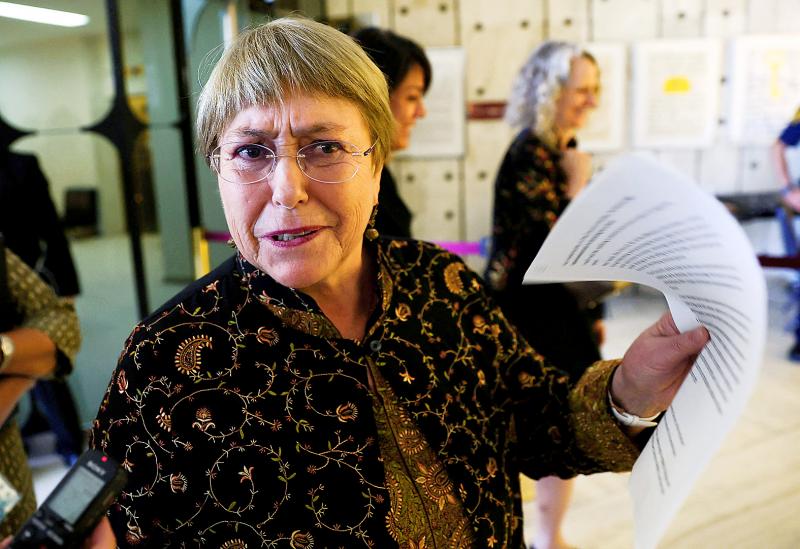UN High Commissioner for Human Rights Michelle Bachelet on Wednesday said she was unable to visit detained Uighurs and that she was accompanied by authorities while visiting Xinjiang, remarks that raise questions about the Chinese government’s efforts to influence her trip.
“I was not able to speak to any Uighurs currently detained or their families during the visit,” Bachelet told a meeting of the Human Rights Council, adding that the visit to China faced “limitations, especially given the prevailing COVID restrictions.”
Bachelet did say the government helped her meet “all institutions I had asked to meet, such as senior members of key ministries, the judiciary, business, academia and other relevant stakeholders,” and repeated that her trip was not an “investigation.”

Photo: Reuters
Human rights advocates have criticized Bachelet’s visit to China — the first by a UN human rights chief since 2005. Sophie Richardson, the China director at Human Rights Watch, said earlier it gave the Chinese government the lack of criticism on human rights that it desired.
US Secretary of State Antony Blinken’s press office also said that Washington was concerned about Beijing’s efforts to manipulate Bachelet’s travels because conditions imposed by the government would not allow for an “independent assessment of the human rights environment.”
Rights issues have turned into a flashpoint in China-US ties. The topic is likely to become even more charged on Tuesday next week, when the US will start blocking imports from Xinjiang under the Uyghur Forced Labor Prevention Act unless companies can prove the goods were not made with forced labor.
China has called on the US to abandon the law, and regularly denies it commits abuses in Xinjiang and elsewhere. The US, lawmakers in some nations and rights groups say China’s activities in Xinjiang amount to genocide against minority groups.
Chinese President Xi Jinping (習近平) signaled his nation is unlikely to back down on the issue, writing in a Chinese Communist Party magazine this month that certain nations “have been forcibly promoting Western democratic human rights concepts and systems in the world and using human rights issues to interfere in the internal affairs of other countries, resulting in frequent wars, long-term social unrest and displacement of people in some countries.”
On Tuesday, the Netherlands issued a statement on behalf of the 47 members of the Human Rights Council that told Bachelet the members are “gravely concerned about the human rights situation in Xinjiang.”

Asian perspectives of the US have shifted from a country once perceived as a force of “moral legitimacy” to something akin to “a landlord seeking rent,” Singaporean Minister for Defence Ng Eng Hen (黃永宏) said on the sidelines of an international security meeting. Ng said in a round-table discussion at the Munich Security Conference in Germany that assumptions undertaken in the years after the end of World War II have fundamentally changed. One example is that from the time of former US president John F. Kennedy’s inaugural address more than 60 years ago, the image of the US was of a country

‘UNUSUAL EVENT’: The Australian defense minister said that the Chinese navy task group was entitled to be where it was, but Australia would be watching it closely The Australian and New Zealand militaries were monitoring three Chinese warships moving unusually far south along Australia’s east coast on an unknown mission, officials said yesterday. The Australian government a week ago said that the warships had traveled through Southeast Asia and the Coral Sea, and were approaching northeast Australia. Australian Minister for Defence Richard Marles yesterday said that the Chinese ships — the Hengyang naval frigate, the Zunyi cruiser and the Weishanhu replenishment vessel — were “off the east coast of Australia.” Defense officials did not respond to a request for comment on a Financial Times report that the task group from

BLIND COST CUTTING: A DOGE push to lay off 2,000 energy department workers resulted in hundreds of staff at a nuclear security agency being fired — then ‘unfired’ US President Donald Trump’s administration has halted the firings of hundreds of federal employees who were tasked with working on the nation’s nuclear weapons programs, in an about-face that has left workers confused and experts cautioning that the Department of Government Efficiency’s (DOGE’s) blind cost cutting would put communities at risk. Three US officials who spoke to The Associated Press said up to 350 employees at the National Nuclear Security Administration (NNSA) were abruptly laid off late on Thursday, with some losing access to e-mail before they’d learned they were fired, only to try to enter their offices on Friday morning

STEADFAST DART: The six-week exercise, which involves about 10,000 troops from nine nations, focuses on rapid deployment scenarios and multidomain operations NATO is testing its ability to rapidly deploy across eastern Europe — without direct US assistance — as Washington shifts its approach toward European defense and the war in Ukraine. The six-week Steadfast Dart 2025 exercises across Bulgaria, Romania and Greece are taking place as Russia’s invasion of Ukraine approaches the three-year mark. They involve about 10,000 troops from nine nations and represent the largest NATO operation planned this year. The US absence from the exercises comes as European nations scramble to build greater military self-sufficiency over their concerns about the commitment of US President Donald Trump’s administration to common defense and